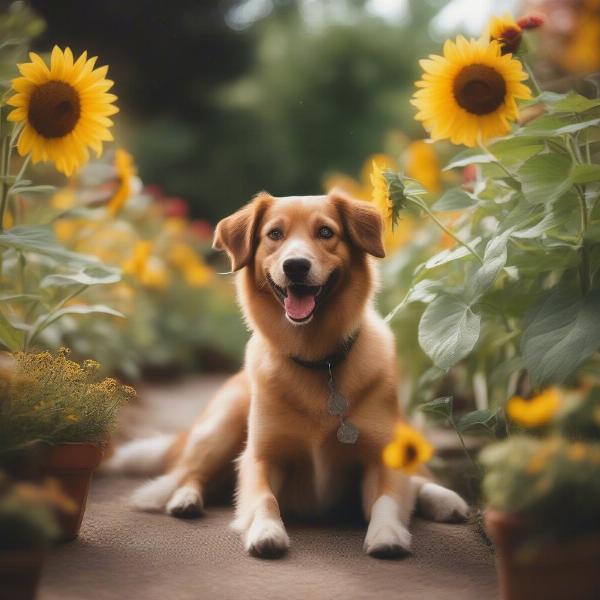Alyssum, with its delicate, honey-scented flowers, is a popular choice for gardens. But if you’re a dog owner, you might be wondering, “Is alyssum poisonous to dogs?” The good news is that sweet alyssum (Lobularia maritima) is generally considered non-toxic to dogs. However, it’s important to understand the nuances of this topic to ensure your furry friend’s safety.
While sweet alyssum isn’t considered toxic, ingesting large quantities of any plant material can cause gastrointestinal upset in dogs. This can manifest as vomiting, diarrhea, or loss of appetite. Some dogs may also experience mild skin irritation if they come into contact with the plant sap. It’s crucial to monitor your dog’s behavior after they’ve been around alyssum. If they exhibit any unusual symptoms, consult your veterinarian. Remember, prevention is always better than cure.
Understanding Alyssum and its Potential Effects on Dogs
Alyssum is a genus of about 100–170 species of flowering plants in the family Brassicaceae. Sweet alyssum, the variety commonly found in gardens, is not poisonous. However, there are other varieties of alyssum, and it’s essential to identify the specific type growing in your garden or encountered during walks. If you are unsure about the type of alyssum, it’s best to err on the side of caution and keep your dog away from it.
What to Do if Your Dog Eats Alyssum
If your dog ingests a small amount of sweet alyssum, they are unlikely to experience any adverse effects. However, monitor them for any signs of digestive upset, such as vomiting or diarrhea. If your dog consumes a large quantity of alyssum, or if they exhibit any unusual symptoms, contact your veterinarian immediately. Provide your vet with as much information as possible, including the type of alyssum (if known) and the quantity ingested.
Preventing Alyssum-Related Issues in Dogs
The simplest way to prevent potential problems is to keep alyssum out of your dog’s reach. If you’re planting alyssum in your garden, consider placing it in a raised bed or a fenced-off area. When walking your dog, be mindful of the plants they encounter and steer them clear of any unknown varieties. Training your dog to “leave it” can also be a valuable tool in preventing them from consuming potentially harmful plants.
Other Plants Toxic to Dogs
While sweet alyssum is generally safe, many other common garden plants are toxic to dogs. These include tulips, daffodils, azaleas, and sago palms. Familiarize yourself with the plants in your garden and surrounding areas and remove any that pose a threat to your dog’s health.
Conclusion
Sweet alyssum is generally considered safe for dogs. However, large quantities can cause mild gastrointestinal upset. It’s best to prevent your dog from eating any type of alyssum to be safe. If your dog shows signs of illness after ingesting alyssum, contact your veterinarian.
FAQ
- Is alyssum safe for dogs to smell? Yes, the scent of sweet alyssum is not harmful to dogs.
- What are the signs of plant poisoning in dogs? Signs can vary depending on the plant but may include vomiting, diarrhea, lethargy, tremors, and difficulty breathing.
- Can alyssum cause skin irritation in dogs? Some dogs may experience mild skin irritation from contact with alyssum sap.
- What should I do if my dog eats an unknown plant? Contact your veterinarian immediately and, if possible, identify the plant.
- Are there any dog-friendly alternatives to alyssum? Yes, consider planting pet-friendly flowers such as sunflowers, zinnias, or snapdragons.
 Dog Playing in a Safe Garden
Dog Playing in a Safe Garden
ILM Dog is a leading online resource for dog care and wellbeing. We offer expert advice on everything from breed selection and puppy care to senior dog health and training. Our mission is to empower dog owners with the knowledge and resources they need to provide their furry companions with the best possible care. For professional guidance and personalized support, contact our team of experts. Email: [email protected]. Phone: +44 20-3965-8624. Visit ILM Dog for more valuable information on dog care and connect with our community of passionate dog lovers.